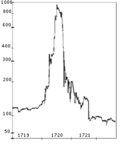Portal:Business
The Business and Economics Portal  Business is the practice of making one's living or making money by producing or buying and selling products (such as goods and services). It is also "any activity or enterprise entered into for profit." A business entity is not necessarily separate from the owner and the creditors can hold the owner liable for debts the business has acquired except for limited liability company. The taxation system for businesses is different from that of the corporates. A business structure does not allow for corporate tax rates. The proprietor is personally taxed on all income from the business. A distinction is made in law and public offices between the term business and a company (such as a corporation or cooperative). Colloquially, the terms are used interchangeably. (Full article...) Economics (/ˌɛkəˈnɒmɪks, ˌiːkə-/) is a social science that studies the production, distribution, and consumption of goods and services. Economics focuses on the behaviour and interactions of economic agents and how economies work. Microeconomics analyses what is viewed as basic elements within economies, including individual agents and markets, their interactions, and the outcomes of interactions. Individual agents may include, for example, households, firms, buyers, and sellers. Macroeconomics analyses economies as systems where production, distribution, consumption, savings, and investment expenditure interact; and the factors of production affecting them, such as: labour, capital, land, and enterprise, inflation, economic growth, and public policies that impact these elements. It also seeks to analyse and describe the global economy. (Full article...) Selected articleThe London congestion charge is a fee charged on most motor vehicles operating within the Congestion Charge Zone (CCZ) in central London between 07:00 and 18:00 (Monday-Friday only). The charge, which was introduced on 17 February 2003, remains one of the largest congestion zones in the world despite the cancellation of the Western Extension which operated between February 2007 and January 2011. The charge aims to reduce congestion, and to raise investment funds for London's transport system. The standard charge is £10 for each day, for each non-exempt vehicle that travels within the zone with a penalty of between £60 and £187 levied for non-payment. Enforcement is primarily based on automatic number plate recognition (ANPR). Transport for London (TfL) is responsible for the charge which has been operated by IBM since 1 November 2009. Selected image
Selected economyThe economy of Poland is an emerging and developing, high-income, industrialized mixed economy that is the sixth-largest in the European Union by nominal GDP and fifth-largest by GDP (PPP). Poland has the extensive public services characteristic of most developed economies and is one of few countries in Europe to require no tuition fees for undergraduate and postgraduate education and with universal public healthcare that is free at a point of use. Since 1988, Poland has pursued a policy of economic liberalisation but retained an advanced public welfare system. It ranks 19th worldwide in terms of GDP (PPP), 20th in terms of GDP (nominal), and 21st in the 2023 Economic Complexity Index. Among OECD nations, Poland has a highly efficient and strong social security system; social expenditure stood at roughly 22.7% of GDP. The largest component of Poland's economy is the service sector (62.3%), followed by industry (34.2%) and agriculture (3.5%). Following the economic reform of 1989, Poland's external debt has increased from $42.2 billion in 1989 to $365.2 billion in 2014. Poland shipped US$224.6 billion worth of goods around the globe in 2017, while exports increased to US$221.4 billion. The country's top export goods include machinery, electronic equipment, vehicles, furniture, and plastics. Poland was the only economy in the EU to avoid a recession during the 2008 financial crisis. (Full article...) Selected quote"At Toyota, we began to think about how to install an autonomic nervous system in our own rapidly growing business organization. In our production plant, an autonomic nerve means making judgments autonomously at the lowest possible level; for example, when to stop production, what sequence to follow in making parts, or when overtime is necessary to produce the required amount. These discussions can be made by factory workers themselves, without having to consult the production control or engineering departments that correspond to the brain in the human body. The plant should be a place where such judgments can be made by workers autonomously. In Toyota's case, I believe this autonomic nervous system grew as the idea of just-in-time penetrated broadly and deeply into the production field, and as adherence to the rules increased through the use of kanban. As I thought about the business organization and the autonomic nerves in the human body, the concept began to interconnect, overlap, and stir my imagination."
TopicsRelated WikiProjectsDid you know (auto-generated) -
On this day in business history
General imagesThe following are images from various business-related articles on Wikipedia.
More did you know
Business news
SubcategoriesRelated portals
Things you can doUrgent and important articles are bold
WikimediaThe following Wikimedia Foundation sister projects provide more on this subject:
SourcesDiscover Wikipedia using portals |

































